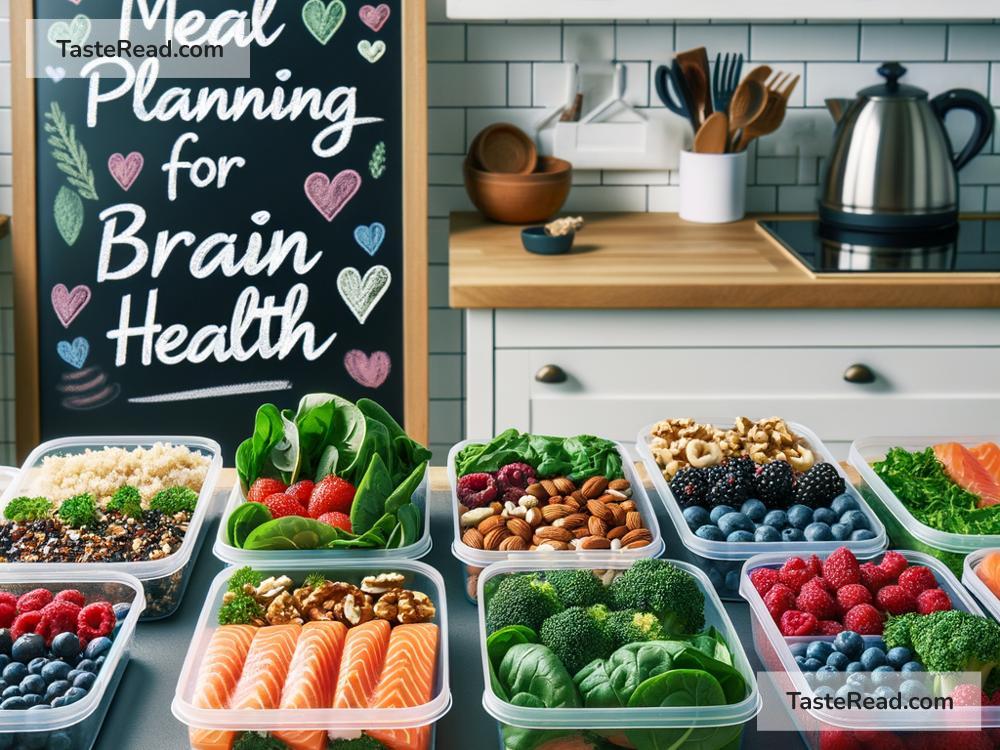How to Plan Meals for Optimal Cognitive Function
Good food isn’t just fuel for your body—it’s also key for your mind. What you eat affects how your brain works, including your memory, focus, mood, and overall cognitive function. If you’ve ever felt sluggish or forgetful after eating junk food, there’s a reason for that! The brain thrives on nutrients, and giving it the right ones can help you think more clearly, stay alert, and feel more mentally sharp. In this guide, we’ll show you simple steps to plan meals that support your brain health and cognitive function.
1. Know Your Brain’s Favorite Nutrients
The brain is like a complex machine, and it needs certain “building blocks” to function well. Here are some key nutrients your brain loves:
- Omega-3 Fatty Acids: Found in salmon, walnuts, and flaxseeds, these fats support brain health by building strong cell membranes and reducing inflammation.
- Antioxidants: Found in berries, spinach, and dark chocolate, antioxidants protect your brain cells from damage caused by free radicals.
- Vitamin E: Found in almonds, sunflower seeds, and avocados, this vitamin helps slow down cognitive decline.
- B Vitamins: Found in eggs, leafy greens, and beans, B vitamins are essential for energy production and brain health.
- Choline: Found in eggs and broccoli, choline supports memory and learning.
- Complex Carbohydrates: Whole grains like brown rice, oats, and quinoa release glucose slowly, giving your brain steady energy throughout the day.
When planning meals, aim to include a variety of these nutrients to keep your brain happy and functioning at its best.
2. Stick to Whole, Unprocessed Foods
Processed foods often contain high amounts of sugar, unhealthy fats, and chemicals, which can hurt your brain in the long run. Instead, focus on whole foods that are as close to their natural state as possible. For example, choose fresh fruits instead of sugary snacks, or whole-grain bread instead of white bread.
Whole foods are packed with the nutrients your brain needs, without the harmful additives that processed foods often contain. Swap out packaged breakfast cereals for oatmeal topped with fresh berries, or replace fast-food burgers with home-cooked meals that include lean proteins and vegetables.
3. Eat Balanced Meals
A balanced meal includes a mix of protein, healthy fats, complex carbs, and fiber. Here’s why each component matters:
- Protein: Helps repair brain tissue and creates neurotransmitters, which are essential for communication between brain cells.
- Healthy Fats: Provide long-lasting energy and are crucial for overall brain health.
- Complex Carbs: Supply steady energy to the brain.
- Fiber: Helps regulate blood sugar levels so your brain doesn’t experience energy crashes.
For example, a great brain-health lunch could be a salad with spinach, grilled chicken (protein), avocado (healthy fats), quinoa (complex carbs), and a drizzle of olive oil (more healthy fats).
4. Snack Smart
Snacks are an important part of your meal plan, especially if you’re someone who gets hungry between meals. But instead of reaching for chips or candy, choose brain-boosting snacks like nuts, seeds, yogurt, or fruit. These options provide nutrients and sustained energy, rather than the sugar spikes and crashes caused by unhealthy snacks.
For example, a handful of walnuts and blueberries makes for a quick, nutritious snack that’s rich in omega-3s and antioxidants.
5. Stay Hydrated
Water is essential for brain function. Dehydration can lead to poor concentration, fatigue, and even headaches. Aim to drink at least 8–10 glasses of water a day, and consider adding some brain-friendly beverages like green tea or herbal teas. Green tea contains compounds that may enhance focus and memory. Just go easy on sugary drinks, as high sugar intake harms cognitive function.
6. Time Your Meals
When you eat is just as important as what you eat. Skipping meals—especially breakfast—can leave your brain without the energy it needs to perform. Breakfast is especially important because it kickstarts your day with fuel for your brain after a long night without food.
Try to eat regular meals spaced out evenly throughout the day. This helps maintain stable blood sugar levels, supporting steady brain function. If your schedule is hectic, prepping meals ahead of time can ensure you have healthy options ready when hunger strikes.
7. Limit Foods That Hurt Your Brain
While some foods boost cognitive function, others do the opposite. Limit or avoid the following:
- Sugary Foods: Sugar spikes can lead to energy crashes, and high sugar intake over time can harm brain health.
- Trans Fats: Found in fried foods and bakery snacks, these fats contribute to inflammation and may increase the risk of cognitive decline.
- Alcohol: Excessive drinking can impair memory and brain function in the long term.
- Highly Processed Junk Food: Chips, candy, and soda might taste good, but they offer no nutritional value for your brain.
8. Make It Easy
Planning meals for cognitive health doesn’t have to be complicated. Here are a few tips to simplify the process:
- Meal Prep: Take an hour each week to prepare and store healthy meals and snacks so you have them ready to go.
- Stock Your Pantry: Keep brain-friendly staples like nuts, oats, olive oil, and frozen veggies on hand, so you can throw together a quick meal anytime.
- Start Small: If overhauling your diet feels overwhelming, start by adding one brain-healthy food each day. For example, swap your usual breakfast for a smoothie made with spinach, banana, and almond milk.
Final Thoughts
What you eat matters, not just for your body but for your brain. By planning meals with brain-boosting nutrients, staying hydrated, and choosing whole, balanced foods, you can improve your focus, memory, and mood. Small, consistent changes to your diet can make a big difference in how your mind works. Start today by nourishing your brain—you’ll be amazed at how good food can make you feel and think!


